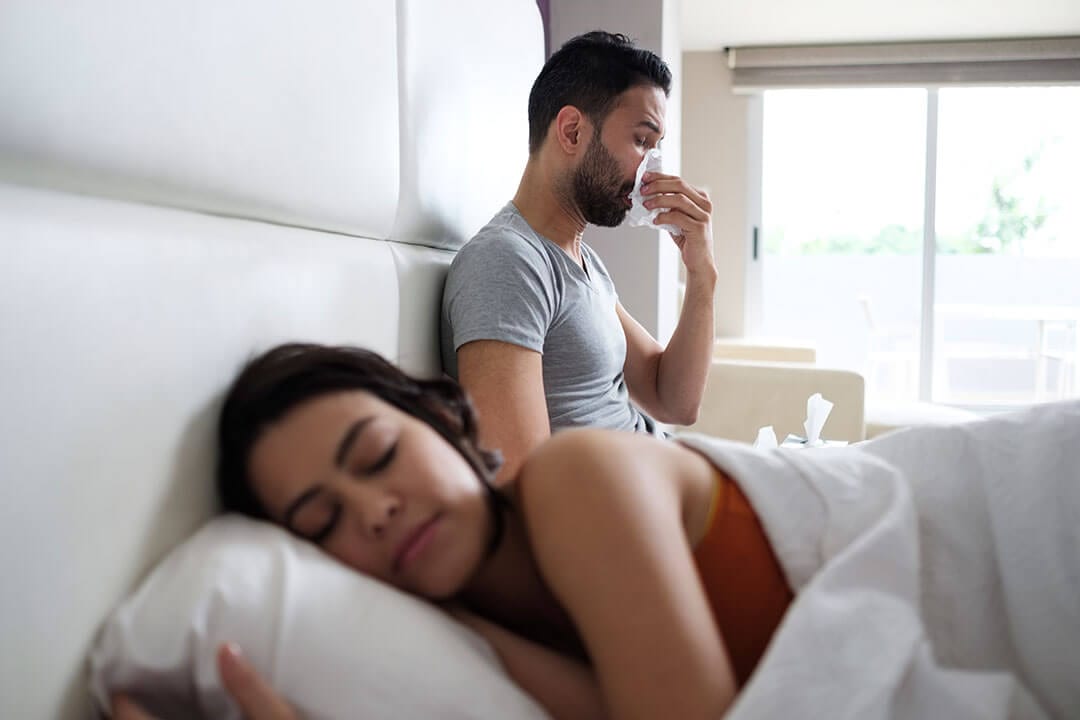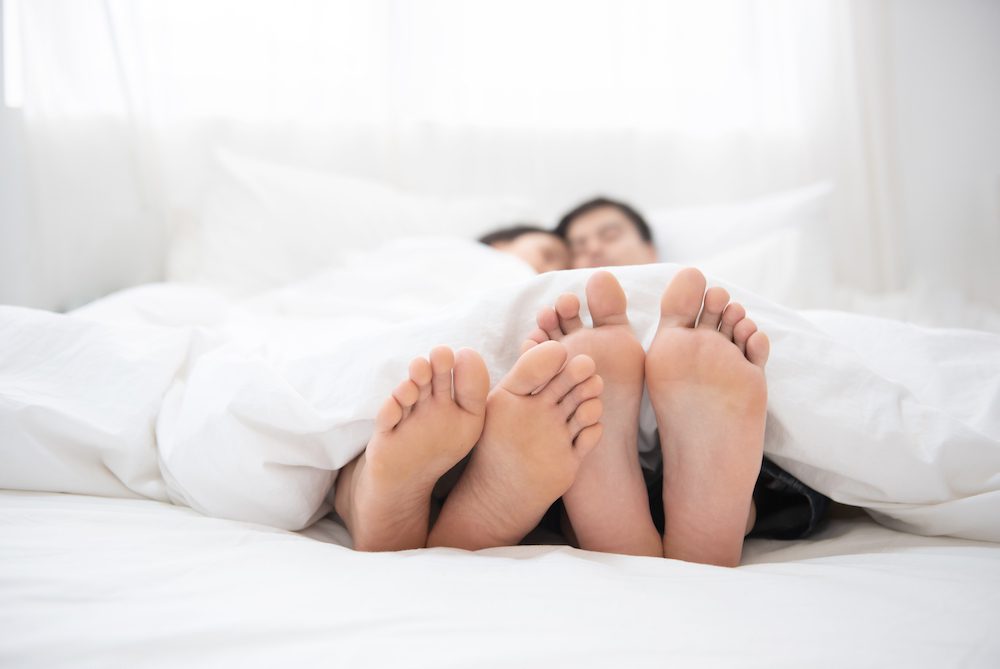About 60% of people get nosebleeds, which are also known as epistaxis. Nosebleeds can occur at any time, including at night during sleep. Nosebleeds can be caused by many triggers such as allergens or dry air.
For people who get repeated nosebleeds at night, it’s helpful to understand the possible causes and learn how to change your sleeping environment in order to prevent them from reoccurring.
What Causes Nosebleeds While Sleeping?
There are various reasons why nosebleeds can happen while sleeping. The nostrils are filled with lots of small blood vessels that can easily break when irritated by things in the environment such as dry air. Certain people are more prone to nosebleeds than others due to age, allergies, or an underlying medical condition.
There are two main types of nosebleeds, based on where the bleeding is coming from.
- Anterior Nosebleeds: This is the most common type of nosebleed. Anterior nosebleeds are rarely serious since they are usually due to irritation of the small blood vessels that line the nose.
- Posterior Nosebleeds: Posterior nosebleeds are more serious and result from injury deeper inside of the nose or head. This type of nosebleed generally requires immediate care.
Cold or Dry Air
Nosebleeds are generally more common during the winter. This could be due to cold air exposure or sleeping in a heated room without a humidifier.
When exposed to cold air, the cell lining of the nose can dry up and start to shed more. Indoor heating can also reduce moisture in the air, which can dry out the lining of the nose and irritate it, making it susceptible to bleeding.
Air Pollution
Air pollution is another environmental factor that may cause nosebleeds. More people tend to report nosebleeds when concentrations of dust, smoke, and smog in the air are higher.
Some research suggests that air pollutants may cause cell damage to the lining of the nose, making it more sensitive to irritants.
Allergies
Allergies may also cause nosebleeds. When exposed to irritating allergens, the body sends more blood to the affected areas. If allergens are in the nose, this increase in blood in the nose can make it more likely to bleed.
Medications
Certain medications called blood thinners, which are designed to prevent blood clots from forming, increase the chances of nosebleeds. People who take aspirin may also be more likely to get nosebleeds.
Illness
While most nosebleeds are harmless, sometimes they can be a symptom of another health condition. Health conditions that affect the way blood moves through blood vessels, such as high blood pressure, heart failure, or bleeding disorders, can all cause nosebleeds.
Additionally, the common cold may lead to nosebleeds in some people due to the irritation caused by sneezing or blowing the nose forcefully.
Age
Nosebleeds tend to be more common in younger children and older adults. As a child ages into adulthood, they tend to get fewer nosebleeds. Nosebleeds then become more common again starting in a person’s forties and into older adulthood as the arteries thicken with age.
Children and Nosebleeds
Nosebleeds are particularly common in children between the ages of 2 and 10 years old. Around 30% of children up to 5 years old and 50% of children over 5 years of age experience nosebleeds.
This is likely because young children irritate their noses more often than adults. For example, a child may pick their nose, place small objects in their nostrils, or experience trauma to the nose from sports or accidents.
Children may also have recurring nosebleeds which are usually harmless and caused by irritants such as dry air, nose picking, or recurring respiratory infections. However, parents and caregivers who are concerned can speak to their child’s pediatrician for assessment and treatment.
Other less-common causes of nosebleeds in children include:
- Bleeding and inflammatory disorders
- Medications, such as aspirin and blood thinners
- High blood pressure
- Infection
How to Stop a Nosebleed
Many nosebleeds will resolve on their own, but there are certain things you can do at home to ease the bleeding.
- Apply Pressure: Gently pinch the nostrils around the soft part of the nose. It is not recommended to stuff gauze into the nostrils.
- Sit Up and Lean Forward: If you are lying in bed, it is important to sit up and lean forward without tilting your head back in order to prevent yourself from swallowing the blood.
- Rest and Compress: Stay in an upright position with pressure on the nose for at least 10 minutes before removing your fingers to check if the bleeding has stopped. It can also help to place a cold compress across your nose.
- Avoid Irritating the Nose: Try to avoid blowing your nose or sniffing too hard after the bleeding has stopped in order to prevent a repeat nosebleed.
If your nose is still bleeding, you can try repeating these steps, making sure to apply pressure to the nose for at least 30 minutes total. If you’re unable to stop a nosebleed, seek out medical treatment at an urgent care clinic or emergency room.
How to Prevent Nosebleeds at Night
To prevent nosebleeds at night, minimize your exposure to irritants in that bedroom that can affect the nose. Sleep with a humidifier on in order to combat dry air. You can also use over-the-counter nasal saline sprays or petroleum jelly to apply moisture directly to the inside of the nose before bed.
Try to avoid habits that may irritate the nose, such as picking your nose or blowing your nose too hard.
When to Speak to a Doctor
If your nose continues to bleed after you have tried at-home remedies or if you are experiencing any additional symptoms such as tiredness or difficulty breathing, see a doctor.
Speak with your doctor about your nosebleeds if you are taking any blood thinners, have experienced a head injury that may be related to the bleeding, or have frequent or severe nosebleeds. Your doctor can evaluate you further and help treat the cause of your nosebleeds.
References
Ask the Sleep Doctor
Have questions about sleep? Submit them here! We use your questions to help us decide topics for articles, videos, and newsletters. We try to answer as many questions as possible. You can also send us an email. Please note, we cannot provide specific medical advice, and always recommend you contact your doctor for any medical matters.




